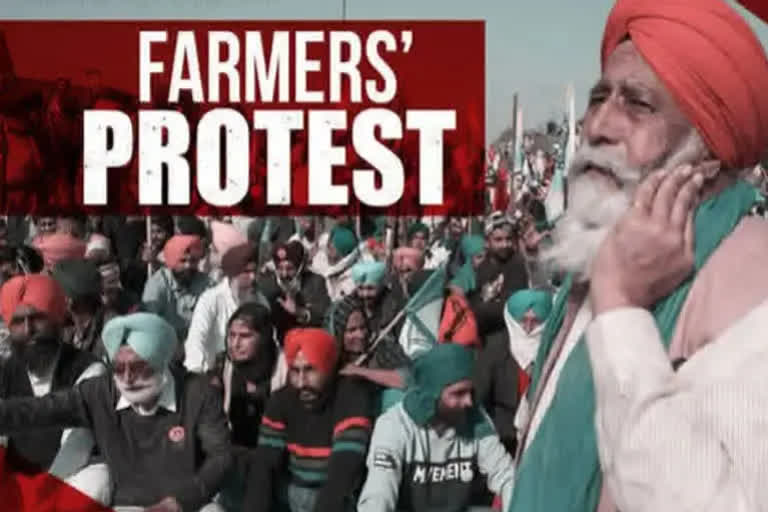New Delhi: A joint group of farmers camping at the borders of national capital New Delhi for more than a year has started withdrawing from the protest sites on Saturday. It's more than a year for the protesting farmers that came from different regions of Punjab, Haryana, Rajasthan and also from Western Uttar Pradesh, demanding the repeal of three farm laws passed by Prime Minister Narendra Modi's government in September last year.
The return of farmers from Delhi border symbolises a year-long eventful struggle against the government that earlier refused to budge, but eventually conceded to the demands of powerful farmer's groups, that organised themselves as Samyukt Kisan Morcha (Joint Farmers' Front), an umbrella organisation of over 30 farmers groups.
It is a major victory for these farmer's organisations as their struggle saw several ups and downs, including court battles, agitation and tractor rallies, but finally succeeded in bending the government which enjoys a clear majority in the Lok Sabha.
Protests confined to Punjab spread elsewhere
In June last year, the Centre used the ordinance route for agriculture sector reform as it enacted three ordinances. According to reports, farmers started organising protests in Punjab against the three laws from August last year.
These protests started to take a more concrete shape as soon as they were passed by the Parliament in September 2020. However, these protests were mainly confined to Punjab, an agrarian state on the Pakistan border that is known as the food bowl of the country.
The farmer’s protests also did not attract much attention in mainstream media at that time except the three-day rail blockade called by farmers in Punjab on September 24 and a nationwide road blockade in early November.
The farmer's protest became a national issue as soon as these groups gave a call to move to the national capital Delhi in November last year. Authorities refused permission citing Covid protocol. Farmers groups marching towards Delhi faced water canons and several other hurdles but they succeeded in setting their camps on the outskirts of Delhi, at Singhu border, Tikri border and Ghazipur border.
Farmers also rejected the government's appeal to vacate the borders and move to an alternate site, the Burari ground.
In his monthly radio address that is broadcast on the last Sunday of every month, Prime Minister Narendra Modi decided to lead the government’s response and defended the three farm laws in his Mann Ki Baat Programme that was aired on November 29.
Sensing a long-drawn struggle ahead of them, farmers then started setting up community kitchens, known as Langars, brought food grain, and erected temporary structures to house a large number of protesters during the winters.
Government calls for talks
The government started the consultation process when it failed to convince the farmers, and the first round of talks took place in early December last year. The same month Bharatiya Kisan Union (BKU) also moved to the Supreme Court against the three farm laws. Senior ministers like Defence Minister Rajnath Singh, Agriculture Minister Narendra Singh Tomar, and Commerce and Industries Minister Piyush Goyal joined the talks with farmers but failed to persuade them to end their agitation.
A section of media and government supporters also blamed anti-national elements for hijacking the movement. In January, the Supreme Court stayed the operation of the three laws until further orders but the farmers still refused to vacate the borders.
Milestone moment
A tractor parade organised by the protesting farmers on the occasion of Republic Day was an important milestone in the movement. A group of protesters violated the agreed route and reached the iconic Red Fort in Central Delhi and ITO.
They clashed with police which resorted to use of teargas. A farmer died as his tractor turned upside down while trying to run-over a police barricade. Some protesters also hoisted Sikh religious flag Nishan Sahib on the Red fort that was considered an affront to the National flag.
The vandalism at the tractor parade did dent the image of farmer’s protest being a peaceful protest but it highlighted the protests at the global scale as several global activists lent their support to the movement.
Also read:Samyukta Kisan Morcha seeks judicial probe into R-Day violence
Subsequent to vandalism and arson at the tractor parade, Delhi Police registered a case of sedition, citing an alleged plan of action referred to as ‘toolkit’ which was shared by activist Greta Thunberg. Police arrested Punjabi actor Deep Sidhu for vandalism at the Red Fort and also arrested activist Disha Ravi for participating in the alleged conspiracy.
In February, the farmers intensified their agitation by calling for a nationwide rail blockade on December 18 which received mixed response in Punjab and Haryana.
